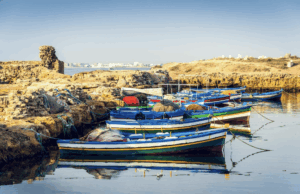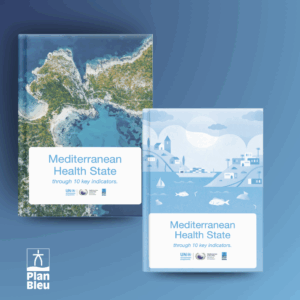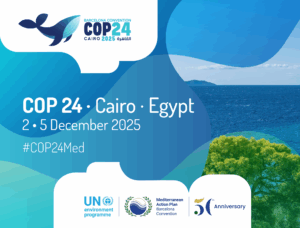Towards a Euro-Mediterranean Sustainable Urban Strategy
In the face of growing urbanization, increasing climate risks, and rising inequalities, the Mediterranean region must rethink its urban models to ensure their resilience and the sustainability of their development. As the population is expected to double in the Eastern and Southern Mediterranean countries by 2050, pressure on coastal areas is increasing, leading to excessive land consumption, accelerated degradation of built heritage, various forms of pollution, and often inadequate waste management.
Urbanization and coastal development: growing challenges
Rapid urbanization is accompanied by excessive land consumption, accelerated degradation of built cultural heritage, multiple types of pollution (groundwater, air, soil), insufficient waste management, and increasing health risks. Mediterranean cities are also increasingly exposed to the impacts of climate change (heatwaves and urban heat islands, floods, rising sea levels), social inequalities, and the vulnerability of certain groups (women, disadvantaged populations).
Historically, Mediterranean cities developed around a strong relationship between urban fabric, agriculture, and the environment. Today, urban growth is disrupting this balance, favoring urban areas at the expense of rural spaces, which are being marginalized or absorbed. This imbalance increases cities’ dependence on external resources and undermines local food security. Widespread metropolitanization, coupled with suburbanization, is profoundly altering the structure of cities and their peripheries. Urban outskirts are growing rapidly, while some city centers are depopulating or seeing their social fabric change.
Coastalization refers to the increasing concentration of human, economic, and urban activities in coastal areas—a phenomenon particularly marked in the Mediterranean since the mid-20th century. This coastal attraction is driven by the development of major infrastructures (tourism, transport, energy, industry), the search for natural resources, and proximity to international markets. The built-up area within one kilometer of the shoreline has doubled or more between 1965 and 2015, leading to urban sprawl and increased fragmentation of coastal landscapes. Today, nearly one in three people lives in the Mediterranean coastal zone, with rates reaching 100% in some island states. This concentration is causing unprecedented artificialization of the coasts, increased pressure on marine and terrestrial biodiversity, and a proliferation of heavy infrastructure such as deep-water ports.
Despite the implementation of regulatory frameworks like the ICZM Protocol, construction within the first 150 meters of the coast exceeds 20% in nearly half of Mediterranean countries. Risks related to erosion, rising sea levels, and extreme weather events are intensifying, threatening populations and infrastructure. Coastalization also brings diversification and intensification of pollution, with the marine environment becoming the receptacle for waste and contaminants from watersheds. In response, integrated coastal zone management, spatial planning, and adaptation of development policies are essential to preserve the Mediterranean’s natural and social capital and ensure sustainable coastal development.
Two Historic Priorities: Transport and Waste Management
- Transport and Mobility: The urban model (compact or sprawling city) strongly determines energy consumption and greenhouse gas emissions. Compact cities with good public transport are less polluting than sprawling, car-dependent cities.
- Waste: Urban growth is accompanied by a significant increase in waste production, whose management often remains inadequate, especially in Southern and Eastern Mediterranean cities. Economic growth and changing consumption patterns are rapidly altering the volume and composition of waste, posing major challenges for collection, treatment, and recovery.
In terms of urban waste, a 2009–2012 work program was conducted to objectively track quantitative and qualitative changes.
As a member of the Union for the Mediterranean (UfM) Urban Working Group, Plan Bleu has contributed to the development of a Euro-Mediterranean sustainable urban strategy.

New Priorities: Urban Resilience and Nature-Based Solutions (NbS)
Climate change, natural risks, and inequalities require strengthening the adaptive capacity of Mediterranean cities. Urban resilience aims to reduce vulnerability while improving quality of life and sustainability. It has become a strategic priority: increasing cities’ capacity to anticipate, absorb, and adapt to climate, environmental, and social shocks.
Within the framework of the Mediterranean Strategy for Sustainable Development (MSSD) and the Barcelona Convention, Plan Bleu supports the adaptation of communities and infrastructure to climate and environmental changes, focusing on urban resilience. Recent activities have produced thematic reports and systemic analyses on climate adaptation, sustainable urban planning, and the integration of NBS, with concrete examples such as urban agriculture in Carthage or wastewater reuse in Tangier, demonstrating social, economic, and environmental benefits for Mediterranean cities.
NbS (green corridors, urban agriculture, stormwater management, ecological restoration, etc.) are promoted as major levers to reduce risks, improve quality of life, strengthen urban biodiversity, and generate co-benefits (reducing heat islands, managing floods, improving biodiversity, health, jobs, circular economy).
Pilot NbS projects have been implemented in several cities, such as Barcelona (green axes), Izmir (heatwave mitigation), and Alexandria (flood management). These initiatives are supported by training for municipal staff and urban planners, dissemination of guides adapted to Mediterranean contexts, and multi-stakeholder consultations involving local authorities, civil society, and the private sector. This participatory approach encourages local ownership of resilience strategies and acceptance of necessary changes.
- Regional training sessions on NbS and ecosystem-based adaptation in Morocco and Montenegro.
- Implementation of pilot projects in Barcelona, Izmir, Alexandria, Carthage, and Tangier.
- Publication of the “Nature-based Solutions for Mediterranean Cities” report and development of the “Climagine” practical guide for participatory adaptation and integrated coastal zone management planning (ICZM).
Istanbul Environment Friendly City Award
In 2016, the Contracting Parties to the Barcelona Convention decided to create the “Istanbul Environment Friendly City Award,” aiming to recognize and reward local authorities’ efforts to improve the environment and quality of life and promote sustainable development in Mediterranean coastal cities and towns.
Funded by the Government of Türkiye, the Istanbul Award is led by the Coordinating Unit of the Mediterranean Action Plan, with assistance from Plan Bleu and support from other MAP components. The first edition of the award was presented at the Conference of the Parties (COP 20) in Tirana (Albania) from December 17 to 20, 2017.
The second edition of the Award was launched on May 6, 2019. After reviewing applications, the Jury awarded the Istanbul Environment Friendly City Award to the city of Ashdod (Israel). The Award was presented at a ceremony held on December 2, 2019, in Naples (Italy) during the 21st Meeting of the Contracting Parties to the Barcelona Convention (COP21). The third edition, organized in 2021, saw the city of Malaga (Spain) receive the Istanbul Award. In 2023, the fourth edition was awarded to the Italian city of Genoa, recognizing its efforts towards urban sustainability. The fifth edition is underway.
All Mediterranean coastal cities, regardless of size, can apply by highlighting their concrete actions for environmental protection, quality of life improvement, and sustainable development promotion, as well as their partnerships with civil society, the private sector, and the scientific community.

Outlook and Priorities for 2025–2027
Plan Bleu’s vision is to deepen work on resilient cities and communities by leveraging Mediterranean cultural heritage, traditional knowledge, and vernacular practices as drivers of innovation and adaptation. Thematic priorities for 2026–2027 include integrated urban resilience to climate risks, mainstreaming NBS for climate change adaptation and ensuring good health for city dwellers, restoration of urban-rural interface landscapes, inclusive and participatory governance, and improving urban resilience data via the Plan Bleu Regional Observatory. Emphasis will also be placed on the ecological connectivity of coastal urban areas and the promotion of the circular and blue economy.
These actions rely on a broad network of regional and international partners and aim to strengthen Mediterranean cities’ ability to adapt to climate change, reduce disaster risks, integrate nature- and culture-based solutions in urban planning, share knowledge, and promote inclusive governance. Plan Bleu asserts itself as a regional center for data, innovation, and dialogue for more resilient and sustainable Mediterranean cities.














